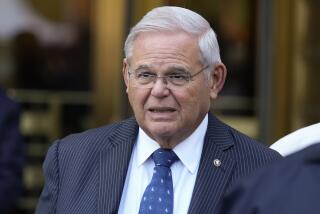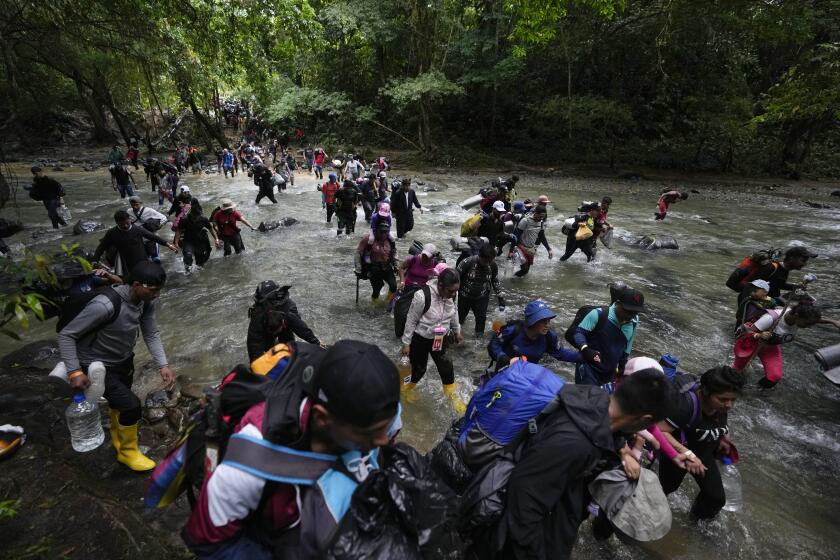Russia to End Most Price Controls by End of March : Economy: Moscow adopts a 1992 reform plan vital to Yeltsin’s hopes of winning more international assistance.
Russia’s government Thursday adopted a 1992 economic reform plan vital to President Boris N. Yeltsin’s hopes for winning more international assistance--and one mandating a virtual end to remaining state price controls by the end of March.
World reaction to the new plan is literally worth billions of dollars, since it will be submitted as a memorandum in support of Russia’s application for membership in the International Monetary Fund, officials said.
Approved by a government meeting chaired by Yeltsin, the blueprint should also muzzle domestic critics. Those critics have included Ruslan I. Khasbulatov, the Speaker of the legislature who charged this week that Yeltsin and his subordinates lack a “clear-cut program of transition to a market.”
Konstantin G. Kagalovsky, Russia’s envoy to international financial institutions, told reporters: “Reproaches have often been made that the government has not made public a program for economic reform. Now, we have completed the work.”
Yegor T. Gaidar, deputy prime minister and chief engineer of the reforms, told other government members that “remaining state-set prices” will be dropped by the end of March, eliminating the need to keep pouring billions of rubles in state subsidies into the consumer sector.
Gaidar said there will be exceptions, including baby food and medicines, news agencies reported. But Russia’s “Vesti” television program said that subsidies for milk and bread will cease in March, imposing yet another hardship on Russians and greatly increasing the risk of consumer backlash.
Government economic adviser Alexei V. Ulyukayev said that all retail prices will be allowed to seek market levels by the year’s end, except for housing, mass transit and “communal services”--utilities such as hot water, heat, electricity and natural gas.
“Our aim is to overcome inflation and declining production and establish the conditions to integrate the Russian economy into the world economy,” he told the same news conference attended by Kagalovsky.
Pushing Russia on the road toward a market economy, Yeltsin abolished Soviet-era controls on most prices Jan. 2, causing at least a trebling in the living cost for the average person. But prices of some staples, including milk, bread and fuel, remained fixed as a wary government tried to dissipate the sting, at least somewhat.
Thursday’s decision to abolish price controls showed Russia’s eagerness to meet IMF demands. Kagalovsky said he hopes the 1992 reform plan, to be published in its entirety next week, will lead to Russia’s acceptance in the IMF “as soon as possible.” Obtaining Western cash for a stabilization fund for the ruble--Kagalovksy said about $6 billion is needed--is contingent upon membership.
The blueprint also commits Russia to a vast program of privatization. Prices for fuel and electricity, laughably low by world standards, will be gradually liberated from ceilings set by bureaucrats and should reach about 30% of world levels, Gaidar said.
Officials said coal and petroleum prices will probably be freed in mid-April, at the end of the winter heating season.
Such painful reform measures, which according to Gaidar have already received IMF approval, should help create “a normally functioning market mechanism by the end of the year,” he told the government. He predicted that the inflation rate, which soared for weeks, should drop to 2% or 3% monthly by that time, which he said would be in line with world levels, news agencies reported.
As far as state spending is concerned, Russia will pursue its efforts to trim expenditures so that after years of rising budget deficits, a balanced budget can be achieved by December, Kagalovsky said.
The decision on whether to grant Russia IMF membership, agreed to in principle in January, will be made at the annual meeting of the interim committee, the monetary fund’s top decision-making body, on April 27 in Washington. The stabilization fund is being put together separately by Western nations, which want Russia to be in the IMF before they hand it over.
“I hope this will happen immediately after our country enters the IMF,” Kagalovsky said. He said Russia wants to receive the stabilization fund as soon as possible but that his government will “pursue reform regardless.”
More to Read
Start your day right
Sign up for Essential California for news, features and recommendations from the L.A. Times and beyond in your inbox six days a week.
You may occasionally receive promotional content from the Los Angeles Times.






